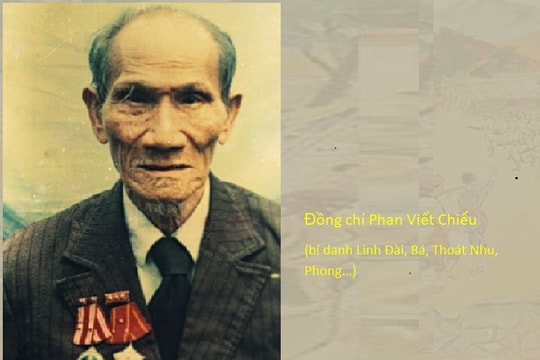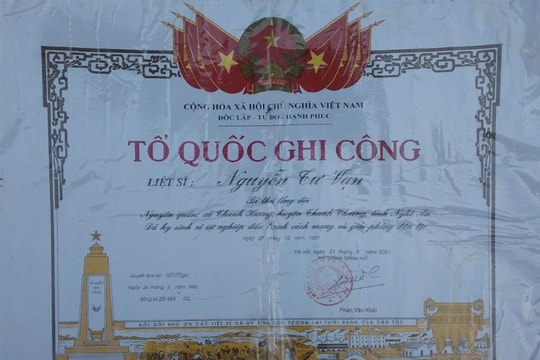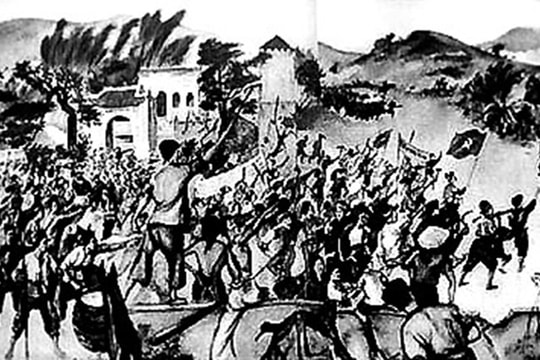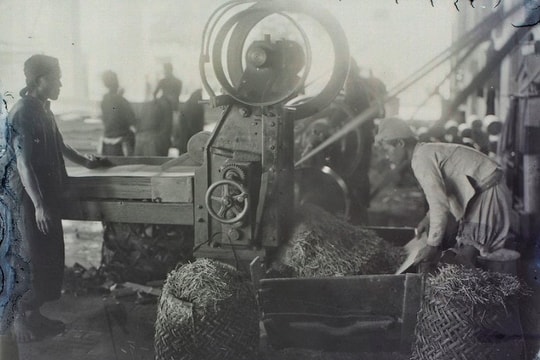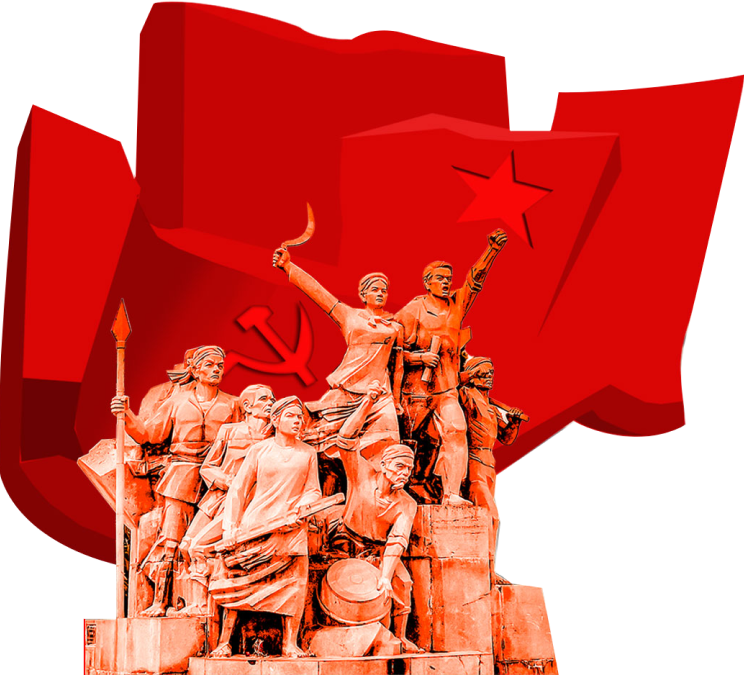Comrade Hoang Trong Tri (1887-1938): An outstanding son of Nghe An homeland
Hoang Trong Tri's childhood name was Hoang Ba Huan, born in 1889 in Loc Da village, Yen Truong commune, Hung Nguyen district (now Hung Loc commune, Vinh city), Nghe An province.
Hoang Trong Tri's father was Hoang Doan Thang, a Confucian scholar with integrity, living close to the masses. His mother was Mrs. Vuong Thi Dieu, a loyal, agile, and resourceful woman. She shouldered all the heavy work of the family and knew how to educate her children with good qualities, love of work, love of the poor, sincerity, and straightforwardness. They had 8 children, Hoang Trong Tri was the second child in the family.
As a child, Hoang Trong Tri studied Chinese characters with his father; not long after, he studied a few more years of Vietnamese. He was intelligent and had a talent for literature and poetry. He often memorized his lessons in class, and in his free time helped his mother work to make a living. During the days of picking rice and potatoes in the fields, Tri often helped other children who were as poor as himself. As he grew older, Tri showed himself to be a strong-willed teenager. Once, Tri and his friends composed verses to mock the unpleasant scenes that took place at the village communal house. Compassion for the poor and hatred for tyrannical power soon blossomed in Hoang Trong Tri's mind.
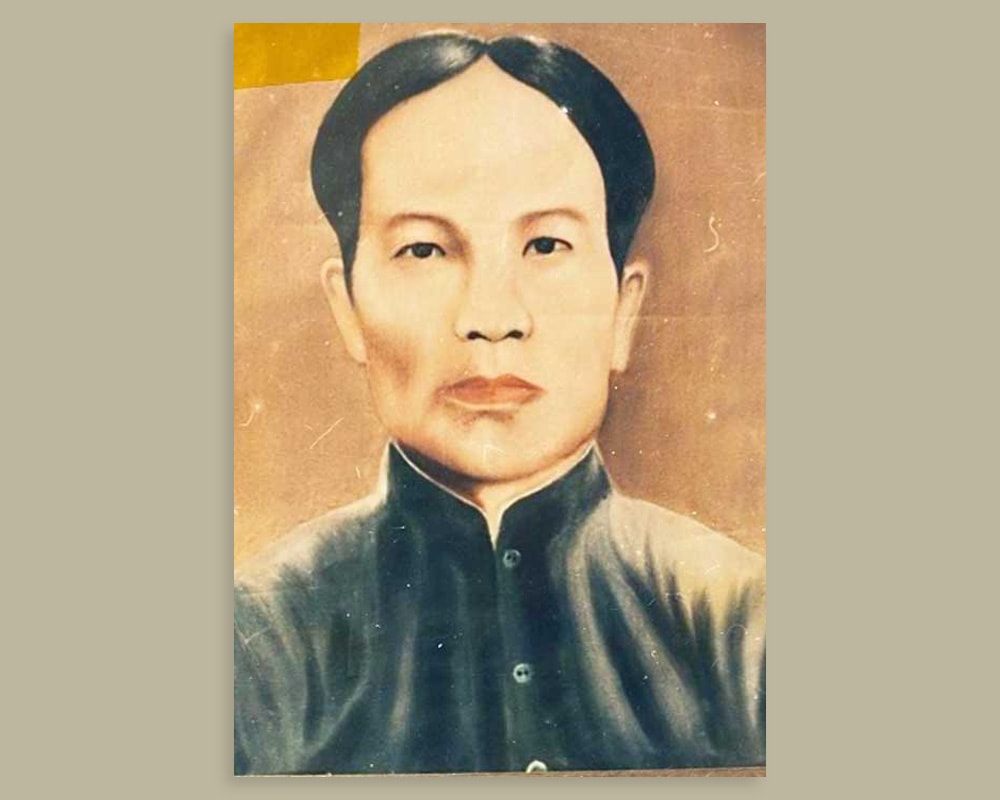
Loc Da village, Hoang Trong Tri's hometown, is located near Vinh city. The French colonialists and landlords robbed all their land, forcing the villagers to live half-farmers, half-workers and soon became aware of the struggle against oppression and exploitation. Revolving around issues of land, taxes, and corvee labor, struggles between farmers and the local authorities took place continuously, year after year. But these struggles did not bring about any significant changes. The lives of Hoang Trong Tri's family and his neighbors remained miserable, deadlocked, and suffocating.
In April 1918, Hoang Trong Tri took the regional exam at Nghe school. Failing the exam, he returned home to follow his father's footsteps and opened a class to teach at home. At that time, the examination system had faded away, and the profession of teaching Chinese characters was no longer as respected as before. Hoang Trong Tri was frustrated with life and the current regime, but he had no idea where to go or what to do.
In early 1919, Hoang Trong Tri's younger brother was drafted into the army. Loving his younger brother and being stronger, Hoang Trong Tri joined the army instead. Hoang Trong Tri's military career lasted 4 years. This was the most bitter and humiliating time for Hoang Trong Tri. Because of his upright nature and his tendency to defy the orders of his commanders, he was pushed from place to place; sometimes he was stationed in the Northern Delta, sometimes he was in the French concession in China... Those years of living in a cage helped him understand more about the evil nature of the French colonialists and the feudal traitors. He wrote a letter to his family and friends expressing his feelings:
Is heroism forever?
The last straw can come when the water breaks the bank.
Water breaks the shore with the wind and waves
The shore could not bear it and had to drift away.
In 1925, after his military service ended, Hoang Trong Tri was discharged and returned to his hometown. Seeing that he was a straightforward, upright person with a wide range of knowledge, the villagers of Loc Da appointed him as a village chief, in charge of keeping the village's books and funds. With his knowledge, Hoang Trong Tri skillfully took advantage of that position to expose corrupt tyrants and defend the farmers. Seeing this, the tyrants tried every way to oppress him. Unable to rely on his position to fight against the entire feudal colonial regime, Hoang Trong Tri sought another path.
In 1925, a number of patriotic intellectuals in Nghe Tinh founded the Phuc Viet Association, choosing Vinh as the location for its headquarters. The Association contacted and recruited Hoang Trong Tri into the ranks of Vietnamese patriots, and he enthusiastically threw himself into his work.
Having established old relationships, assigned by the organization, together with comrades in the Phuc Viet sub-group in the locality, Hoang Trong Tri went to Yen Dung, Duc Thinh, An Hau villages... to meet patriots, to propagate and build up the reputation of the Association. He contributed to organizing groups to study the national language, read progressive books and newspapers, mutual aid and friendship associations, roofing groups, Tet meat groups... in the area. Together with workers and small traders in the city, he mobilized people in the villages to participate in demanding the French colonialists to pardon Phan Boi Chau, and in the mourning movement to pay tribute to Phan Chu Trinh. The struggle against the local landlords, which had been smoldering for a long time, now flared up again. Through these struggles, Hoang Trong Tri began to have the awareness to gather the masses, preparing for new struggles.
From the end of 1926 onwards, in addition to the Phuc Viet organization, the Vietnam Revolutionary Youth Association began to sow the seeds of revolution in Vinh - Ben Thuy. A number of patriotic youths were sent abroad to attend training courses on Marxism - Leninism led by comrade Nguyen Ai Quoc. Through them, the book "The Revolutionary Path" and the weekly newspaper "Thanh Nien" penetrated Nghe Tinh. As a patriotic intellectual, sensitive to the new, Hoang Trong Tri quickly absorbed the light of Marxism - Leninism, becoming one of the advanced elements of the Phuc Viet Association, operating in the direction of the Youth Association.
Fearing the danger of the increasingly widespread communist movement, the French colonialists and feudalists arrested many members of the Phuc Viet and Thanh Nien parties. Some leaders of the Phuc Viet Association (now renamed the Tan Viet Revolutionary Party) wavered in the face of the enemy's terror, but Hoang Trong Tri remained steadfast in his revolutionary determination. The imperialists forbade him from teaching, so he organized small groups to read books and newspapers at night. He mobilized modern intellectuals in the village to fight, forcing the local authorities to burn books and cancel debts for poor farmers. When the French soldiers came to Yen Dung Thuong to occupy land to build an airport, he and the party members in the Phuc Viet sub-group mobilized the people of Loc Da, An Hau, and Duc Thinh villages to come up and coordinate, supporting the people of Yen Dung in the struggle to protect their land and gardens. These struggles became increasingly resounding.
To avoid being tracked by secret agents, Hoang Trong Tri both taught and dispensed traditional medicine. With a bag on his shoulder, Hoang Trong Tri sneaked into villages to take pulses, prescribe medicine, and secretly carry out revolutionary activities. Whether teaching or treating patients, Hoang Trong Tri did everything with care and dedication. The masses increasingly trusted and admired him, even the local authorities had to respect him.
Before the development of the patriotic and revolutionary movement in Nghe Tinh, in June 1929, the Indochinese Communist Party sent comradesNguyen Phong Sacand Tran Van Cung returned to Nghe An to build a Party base. After examining the situation of the mass movement in Yen Dung, Loc Da, and Duc Thinh, Nguyen Phong Sac contacted Hoang Trong Tri. In July 1929, relying on Hoang Trong Tri and the progressive people in the Tan Viet and Thanh Nien organizations, Nguyen Phong Sac chaired a conference to establish the Indochinese Communist Party cell in the rural area northeast of Vinh - Ben Thuy, one of the first four communist cells in Nghe Tinh. Comrade Hoang Trong Tri was elected as the cell secretary.
Mass organizations such as the Farmers' Association, the Youth Union, and the Red Cross... were also established. Many of Hoang Trong Tri's friends, such as Nguyen Don Nhoan, Tran Canh Binh, Pham Xuan Tham, and his entire class, became communist party members and outstanding youth union members. From a patriotic Confucian scholar who was soon enlightened about Marxism-Leninism, Hoang Trong Tri became one of the first communist party members of the Vinh-Ben Thuy Party Committee. Through his activities, he contributed to awakening and guiding the young generation to maturity in the era of proletarian revolution.
In November 1929, on behalf of the Central Region of Indochina Communist Party, comrade Nguyen Phong Sac convened a conference to establish the Nghe An General Farmers' Association in Duong Xuan village, Anh Son prefecture (now Linh Son commune, Anh Son district). In this conference, Hoang Trong Tri was elected to the Executive Committee of the Nghe An General Farmers' Association, directly in charge of the rural area on the outskirts of Vinh.
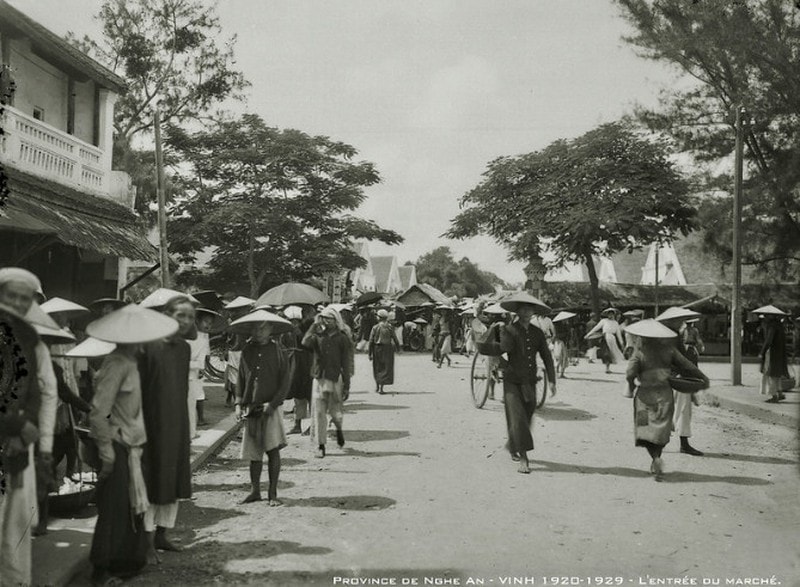
In his new position, under the direction of the Central Region Committee, Hoang Trong Tri made many contributions to building a revolutionary base among the peasant masses, initially building a fighting alliance between peasants and workers.
On February 3, 1930, the Communist Party of Vietnam was born, communists in Nghe Tinh who were active in the Party's predecessor organizations were unified. The Central Region Branch and provincial and district committees were established. Hoang Trong Tri was appointed to the Executive Committee of Vinh - Ben Thuy Provincial Committee.
During the early days of the Party organization, relying on the dense gardens in the rural areas of Yen Dung, Loc Da, Duc Thinh, An Hau... and especially relying on the protection of the people, Hoang Trong Tri and his comrades in arms built many loyal mass bases, turning the rural area near Vinh city into the operating base of the Central Region Branch and Vinh - Ben Thuy Provincial Party Committee. From this base area, many short-term cadre training courses, many secret leaflets and newspapers of the Party were sent to the district offices, contributing to fanning the revolutionary fire of the people of Nghe Tinh.
In the spring of 1930, the revolutionary atmosphere in Nghe Tinh was boiling throughout both urban and rural areas. Factory workers in Ben Thuy fought for higher wages and improved working conditions; farmers in Thanh Chuong, Anh Son, and Can Loc fought against corrupt local officials; students distributed leaflets against the enslavement education system. Fearing the development of the revolutionary movement, on March 13, 1930, the French colonialists and the Southern Dynasty executed two comrades Phan Van Than and Nguyen Duu in Vinh city; in some places, they prepared to suppress the masses.
Faced with that situation, on April 21, 1930, the Central Vietnam Branch and Vinh Ben Thuy Provincial Committee organized a meeting in Loc Da village to assess the situation and plan the struggle. To avoid being monitored by secret agents, Hoang Trong Tri arranged for the delegates to meet in his room. From that room, the Central Vietnam Branch cadre conference outlined a plan of decisive importance, preparing for the first struggle of Nghe Tinh workers and peasants on the glorious holiday of the world's workers (May 1, 1930).
Assigned by the Vinh - Ben Thuy Provincial Party Committee to be in charge of the peasant bloc, Hoang Trong Tri went to the Party cells to directly organize the masses to practice the struggle. He and the specialized cadres of the Branch and the Provincial Party Committee drafted leaflets and slogans, organized printing agencies, and organized a transportation network to transfer documents to the localities. He paid special attention to building a political struggle force among female farmers.
Thanks to careful preparation, early in the morning of May 1, 1930, more than 1,000 peasants from Yen Dung, Loc Da, Duc Thinh, and An Hau villages marched into the city to join the workers in the factories in the struggle. The French colonialists and the feudalists of the Southern Dynasty mobilized all available forces in the city to prevent and suppress the demonstration. But the masses still tightened their ranks and marched into the center of Ben Thuy, raising high the red flag of the hammer and sickle, shouting slogans:
Increase wages, reduce working hours
Tax reduction
Down with French imperialism and the feudal Southern Dynasty.
Support Soviet Russia.
From the time the masses poured into the streets until the demonstration was bloodily suppressed, Hoang Trong Tri always showed himself to be a brave, determined, and daring cadre. When leading the group, when in the middle of the group, when encouraging the masses to charge forward... he always stuck close to the ranks, giving timely and sharp instructions. Immediately after the demonstration was suppressed, Hoang Trong Tri remained undaunted, continuing with the Provincial Party Committee to lead the Party cells to stabilize the morale of the masses, and organizing help for families with victims.
The demonstration on May 1, 1930 of Vinh - Ben Thuy workers and peasants opened the climax of the heroic struggle in the two years of 1930-1931 in Nghe Tinh. It had the effect of awakening millions of people to stand up and fight under the banner of the Communist Party of Vietnam. Frightened by the great influence of the communists, the French colonialists organized a hunt and arrested the key leaders of the demonstration. At dawn on May 5, 1930, Hoang Trong Tri fell into the hands of the enemy.
At Vinh prison, Hoang Trong Tri was imprisoned in Nhi Dong room. Here, he was brutally tortured by secret police, they used a blowtorch to burn from his feet to his chest, causing blisters on his skin in many places. Nine days later, they arrested Hoang Trong Tri's whole family and took him to Vinh prison. Seeing his old mother's bent back walking through the prison door, hearing the cries of his less than a month old son, Hoang Trong Tri felt restless and emotional. But thinking of the Party, thinking of his comrades in arms who had sacrificed their lives, Hoang Trong Tri steadfastly endured everything. Hoang Trong Tri's spirit of perseverance and courage encouraged and motivated his fellow prisoners to maintain their fighting spirit.
On May 30, 1930, the Nghe An Southern Court opened a special trial to try the leaders and participants of the May 1 demonstration. Hoang Trong Tri was sentenced to life imprisonment with sentence number 85 for “communism and leading the May 1, 1930 demonstration in Ben Thuy”. Many communist party members and the masses were sentenced from 3 months in prison to life imprisonment, exiled to Lao Bao.
In Vinh prison as well as all other prisons in Vietnam, patriots always organized struggles against the harsh and brutal regime of the imperialist prisons. Especially, since the communist party members were arrested by the enemy, the struggles became more organized and fierce. Immediately after being arrested by the enemy, Hoang Trong Tri took advantage of his time to meet and get to know his fellow prisoners, to form and organize a secret group in political prisoners. On the basis of this secret group, in June 1930, the communist party members in the prison established a Party cell. Comrade Hoang Trong Tri was elected as Party cell secretary.
The struggle movement in the districts of Nghe Tinh and Nghe An provinces grew stronger, the number of people captured by the enemy and imprisoned in Vinh prison increased. Together with the party members in the cell, comrade Hoang Trong Tri led the prisoners in the struggle against torture and demanded improved living conditions. He established a connection with the Party organization outside the prison, closely followed the struggle taking place throughout the districts in the province, and used that reality to encourage the prisoners.
To strengthen ideological activities, the prison party cell organized the “Prison Weekly Newspaper”. With no paper or ink, comrades composed poems and stories about martyrs and passed them on orally from room to room. Comrade Hoang Trong Tri was both the creator and the disseminator of each issue. Every night, fellow prisoners headed to Nhi Dong room to listen to Hoang Trong Tri read poems. The simple, honest poems, carrying the breath of the seething revolution of tens of thousands of Nghe Tinh workers and peasants awakening and rising up, became the sharp educational weapons of the Party cell. “Breaking the two words tyranny”, “Let’s have a golden and stone faith”, “Not discouraged”… are typical poems of Hoang Trong Tri. From inside Vinh prison, those poems were secretly sent out, contributing to the revolutionary storm taking place in Nghe Tinh:
We are here in prison
Still fighting and waiting outside.
After a period of detention in Vinh prison, at the end of 1930, Hoang Trong Tri was exiled to Lao Bao by the French colonialists. Upon hearing the news, political prisoners in Vinh prison wrote a poem to bid farewell to their beloved comrade:
The news of the death was like a thunderbolt.
I hurriedly awakened my poetic soul...
Moved by his comrade's warm affection, Hoang Trong Tri wrote a few verses in response:
Dear gentlemen, ladies and gentlemen, please advise your children.
Must do our best to fight for our rights.
Success comes from failure
Like a golden statue expressing sympathy
Workers, farmers and soldiers devoted their hearts and souls
To defeat the imperial army,
How to satisfy your wishes,
Vietnam is like the Soviet Union shining in the Russian sky...
After more than 6 years of imprisonment and torture in an imperial prison, Hoang Trong Tri still fought persistently, maintaining the integrity of a communist. In July 1936, in the face of the strong struggle of the mass movement led by our Party, Hoang Trong Tri was released.
Returning to his hometown, although Hoang Trong Tri's health declined, his presence contributed to encouraging revolutionary cadres and masses in Vinh - Ben Thuy.
During his time in Lao Bao prison, Hoang Trong Tri was often tortured by the prison guards and forced to do hard labor in a harsh climate. He suffered a lung injury. When he returned home, his old pain relapsed and his condition became serious. But whenever he was able to get up, he tried to help local cadres build revolutionary bases and lead the masses to fight for freedom and democracy. In difficult circumstances, many former political prisoners, party members and the masses came to visit and take care of Hoang Trong Tri's health.
On October 30, 1938, comrade Hoang Trong Tri, a staunch communist party member and an outstanding son of his homeland, passed away, leaving behind the infinite grief of many party members and revolutionary masses in Nghe An.

